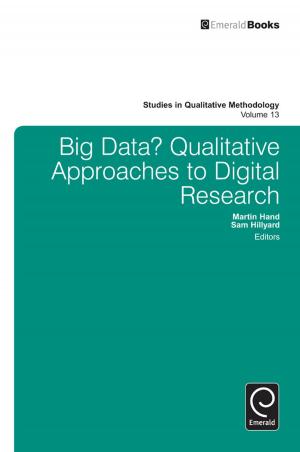Organizing Disaster
The Construction of Humanitarianism
Business & Finance, Human Resources & Personnel Management, Organizational Behavior| Author: | Adam Rostis | ISBN: | 9781785606847 |
| Publisher: | Emerald Group Publishing Limited | Publication: | March 15, 2016 |
| Imprint: | Emerald Group Publishing Limited | Language: | English |
| Author: | Adam Rostis |
| ISBN: | 9781785606847 |
| Publisher: | Emerald Group Publishing Limited |
| Publication: | March 15, 2016 |
| Imprint: | Emerald Group Publishing Limited |
| Language: | English |
This book challenges the taken-for-granted status of organizations such as the Red Cross and Medecins Sans Frontieres by problematizing humanitarianism. In the experience of the Author working with such organizations, they are selective of the type of suffering that receives attention. Empirical studies of humanitarianism note that the suffering it purports to alleviate is increasing although aid is now highly organized, funded, and globalized. These observations inform the key question of the book: what purpose does the humanitarian organization serve? Rostis explores this question through a Foucauldian genealogy of humanitarianism focusing on the European colonial era and the Biafra War. The role of colonialism in the humanitarian organization is made apparent, and facilitates an interpretation of the results of his inquiry using postcolonial theory. This unique contribution to organization studies re-reads humanitarianism to show that humanitarian organizations essentially serve as global disciplinary institutions. It will be essential reading for scholars in political science, international sociology, organization studies and international affairs.
This book challenges the taken-for-granted status of organizations such as the Red Cross and Medecins Sans Frontieres by problematizing humanitarianism. In the experience of the Author working with such organizations, they are selective of the type of suffering that receives attention. Empirical studies of humanitarianism note that the suffering it purports to alleviate is increasing although aid is now highly organized, funded, and globalized. These observations inform the key question of the book: what purpose does the humanitarian organization serve? Rostis explores this question through a Foucauldian genealogy of humanitarianism focusing on the European colonial era and the Biafra War. The role of colonialism in the humanitarian organization is made apparent, and facilitates an interpretation of the results of his inquiry using postcolonial theory. This unique contribution to organization studies re-reads humanitarianism to show that humanitarian organizations essentially serve as global disciplinary institutions. It will be essential reading for scholars in political science, international sociology, organization studies and international affairs.















